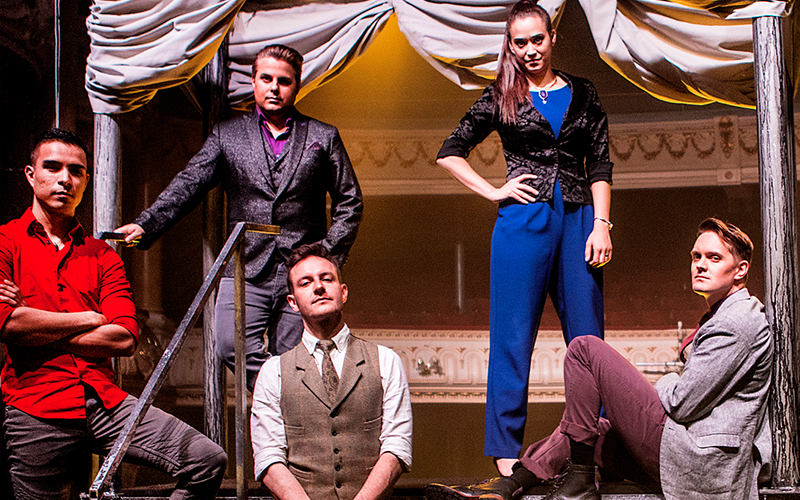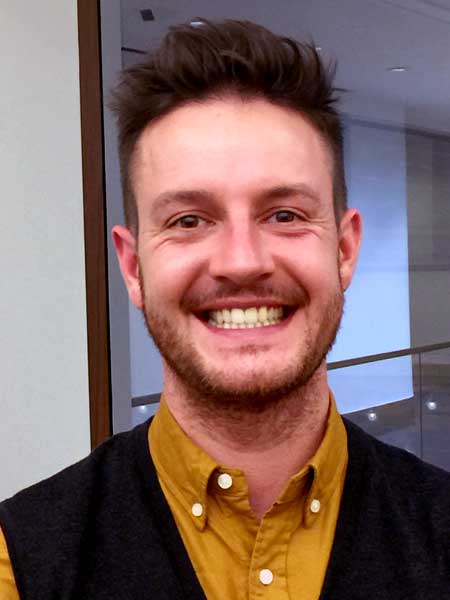Interview
Performance, Magic Show
Champions of Magic
Boch Center
September 20-23, 2018

of “Champions of Magic”
Photo: Charles Munitz
Boston Arts Diary
Alex McAleer, the thirty-two year old mind-reader of the quintet touring as the Champions of Magic, met with a group of Boston-area journalists a couple of weeks ago and talked about the group, the show, and his own training in and philosophy of magic. He’s a delightful and candid fellow, and even though he didn’t tell us how he does his tricks, he was remarkably open about what we think of as magic involves. He topped off the interview with a card-guessing trick that was truly outstanding. Despite his candor about the training and practice of a magician, it was hard to believe he could do what he did.
The group that calls itself Champions of Magic has been touring since 2014, at first in England, then in the US, and now, for the first time, they are coming to Boston. The group is young. Fernando, the escape artist, is twenty, and apparently the others, besides old-man McAleer at thirty-two, are in their late twenties. It certainly is hard to believe that McAleer, even at that ripe old age, has been able to master his craft so effectively. No doubt, after witnessing the talents of his colleagues, one would come away feeling that way about all of them.
The group is a hybrid, put together by a producer who, according to McAleer, began to create shows that were combinations of comedy and magic, then realized that it was a far better idea just to go with pure magic.
The group consists, in addition to mind-reader McAleer, of Kayla Drescher, a close-up magic expert, Fernando Velasco, the escape artist, and Young and Strange (a great name) who are billed as innovative illusionists. McAleer is English and based near Oxford, Drescher is American and based in LA, Velasco was born in Mexico and raised in southern California, while Richard Young and Sam Strange are also English.
Asked about how he got into magic, McAleer says that, as an only child he had lots of hobbies, but that when his mother died when he was fourteen it prompted him to research various forms of mentalism, including what he calls ghost hunting. But soon after he began to buy books on memory tricks and techniques and realized he could wow his friends pretty easily by demonstrating them. He saw, as he says, how much people like this sort of thing. In fact, this theme came up a number of times in our conversation – that audiences seem, in some way, to love being fooled. They don’t care too much to figure out how a trick works – they just relish the idea of enjoying the illusion itself especially when it’s pulled off flawlessly.
McAleer has been performing professionally since 2007 (that would make him twenty-one at the time!). But, before that, he was in amateur shows of one sort or another, and, as he says, always had been on stage.
McAleer is remarkably candid about the fact that magic is not really magic, but a set of learned techniques employed with great skill.
Asked whether mind-reading is a high stakes guessing game, McAleer thrills, and jumps to say I might steal that! He answers very straightforwardly that mind-reading, so-called, is a matter of, as he puts it, always stacking odds in your favor, then having an out; it is not a a psychic gift he readily avers. How refreshing and interesting!
McAleer has written a book about mentalism, and he notes that there is a cottage industry of self-publishing in the magic world, and he joins many other individual practitioners in sharing his thoughts (so to speak).

He points out that there is no Hogwarts for this – one cannot go to an academy to learn the ins and outs of mind-reading. But there are books about various tricks, he observes, and makes the point that you have to read everything.
It’s a rich field with lots of dimensions. There are various books on stage hypnosis, says McAleer, and though I don’t do hypnosis,there are bits that feed into what I do. Psychological tricks and sleight of hand also feed into what he does and reading and learning widely have been crucial to his development as a magician.
He relishes that magic is a form of entertainment that never goes away and points out that, remarkably and surprisingly, people like not knowing how something works.
McAleer notes regional differences in forms of appreciation, remarking that especially in England, you could never get away with pretending to do ‘magic.’
Stressing the importance of the development of the craft, McAleer invokes the example of comedian Jerry Seinfeld who has acknowledged the amount of specific effort he puts into the refinement of technique, the rehearsing and timing of jokes, acknowledging a great similarity to the refinement of his own craft as magician.
McAleer has an offhand humor which is frequently evident. Asked whether the Champions of Magic rehearse, he answers we do rehearse, though magicians are lazier than actors or comedians, but quickly points out the his colleague in Champions of Magic, Fernando Velasco has been working on a new, dangerous stunt and rehearses endlessly.
Asked whether each of the Champions knows the secret to the others’ tricks, he responds that we all indeed know the secrets to one another’s tricks, but it’s sort of fun to wait to find them out.
At the end of the interview, McAleer demonstrated his craft using a pack of cards. Asking for one of the interviewers to help, he questions whether she is familiar with cards, suggesting, hilariously, you’ve seen them at airports. He then asked his subject to think of a suit and a color and then a number of the card. Then he asked her to change that number. Offering up the deck, he reveled her card overturned. Amazing!
As the ad for the show says, with delightful double meaning, get your tickets before they disappear!

of “Champions of Magic”
Photo: Charles Munitz
Boston Arts Diary
– BADMan
Leave a Reply